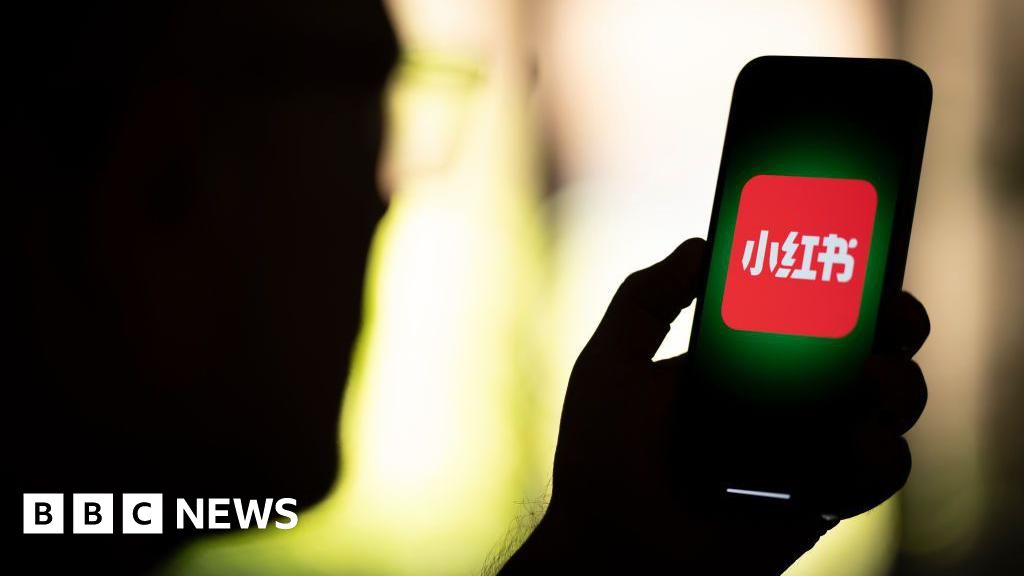In a surprising turn of events, millions of Americans are downloading a Chinese social media app called RedNote, also known as Xiaohongshu, as a potential ban on TikTok draws closer. With the U.S. government set to enforce a law that could remove TikTok from app stores by January 19, 2025, users are seeking alternatives to their beloved video-sharing platform. RedNote, a vibrant app blending short videos, photos, and lifestyle content, has surged to the top of U.S. app store charts, driven by self-proclaimed “TikTok refugees” looking to preserve their online communities and protest the looming ban.

The TikTok Ban: Why It’s Happening
The push to ban TikTok in the U.S. stems from national security concerns tied to its parent company, ByteDance, which is based in China. U.S. lawmakers argue that ByteDance’s ties to the Chinese government could allow it to access American users’ data or manipulate content to influence public opinion. In April 2024, President Joe Biden signed the Protecting Americans from Foreign Adversary Controlled Applications Act, which requires ByteDance to sell TikTok’s U.S. operations by January 19, 2025, or face a nationwide ban. This law would prevent app stores like Apple and Google from offering TikTok, and internet providers would be barred from hosting it, potentially rendering the app unusable over time.
TikTok, with its 170 million American users, has fought back, arguing that the ban violates free speech protections under the First Amendment. The company has refused to sell its U.S. operations, and the Supreme Court, after hearing arguments in January 2025, appears likely to uphold the law. While President-elect Donald Trump has expressed support for keeping TikTok alive, even filing a brief to delay the ban, the uncertainty has pushed users to explore other platforms. For many, RedNote has become the go-to choice, despite its own Chinese ownership, creating an ironic twist in the saga.
RedNote: What Is It?
RedNote, or Xiaohongshu (meaning “Little Red Book” in Mandarin), is a Chinese social media platform launched in 2013 by founders Miranda Qu and Charlwin Mao. Often described as a mix of TikTok, Instagram, and Pinterest, RedNote allows users to share short videos, photos, and text posts about lifestyle topics like fashion, beauty, travel, and food. With over 300 million monthly active users, mostly young women in China, Taiwan, and other Mandarin-speaking regions, the app has become a hub for product reviews, makeup tutorials, and travel recommendations. Its e-commerce features let users shop directly through the app, making it a powerful platform for brands and influencers.

Unlike TikTok, which operates a separate global version from its Chinese counterpart Douyin, RedNote is a single app used by both Chinese and international users. This unified platform has led to a unique cultural exchange, with Americans and Chinese users interacting directly on the app. However, RedNote’s heavy censorship, aligned with Chinese government regulations, has raised concerns about its suitability as a TikTok replacement.
Why Are Users Flocking to RedNote?
The surge in RedNote downloads began in mid-January 2025, when it became the most downloaded free app on Apple’s U.S. App Store. Reports estimate that over 700,000 new users joined RedNote in just two days, with the #tiktokrefugee hashtag racking up over 160,000 posts. For many, the move to RedNote is both a practical choice and a form of protest against the U.S. government’s actions.
Sarah Fotheringham, a 37-year-old school canteen worker from Utah, told the BBC that joining RedNote was her way of “snubbing” the government. “I’m just a simple person living a simple life,” she said. “I don’t have anything that China doesn’t, and if they want my data that bad, they can have it.” Similarly, Marcus Robinson, a fashion designer from Virginia, joined RedNote to promote his clothing brand and stay “ahead of the curve.” Despite hesitating over the app’s Mandarin terms and conditions, he took the leap, reflecting the sentiment of many users willing to overlook privacy concerns for the sake of community and creativity.
Others, like Tennessee tech worker Sydney Crawley, have found RedNote surprisingly engaging. Crawley gained over 6,000 followers in just 24 hours and told the BBC she plans to keep building her platform there, even if TikTok survives. “RedNote opened my world up to China and its people,” she said. “I’m seeing things I never would have seen, like their culture, schools, and everyday life. It’s been so much fun.”
A Cultural Exchange Like No Other
The influx of American users has sparked a lively cultural exchange on RedNote. Chinese users have welcomed their new American counterparts with open arms, offering tips on navigating the app, teaching Mandarin, and even joking about being “Chinese spies” in playful comments. One user from Sichuan commented on an American’s post, “I am your Chinese spy … please surrender your personal information or the photographs of your cat (or dog).” Such lighthearted interactions have broken down barriers, with users sharing cat memes, discussing Taylor Swift, and marveling at China’s electric cars, which are not widely available in the U.S.
Alexis Garman, a 21-year-old from Oklahoma with nearly 20,000 TikTok followers, joined RedNote and described the experience as “great and inviting.” She received comments from Chinese users complimenting her makeup, fostering a sense of connection across borders. Another user, known as Definitelynotchippy, posted a video explaining the migration: “We decided to piss off our government and download an actual Chinese app. We call that trolling … we’re here to learn about China and hang out with you guys.”

However, the app’s strict censorship has been a point of caution. Chinese users have warned Americans to avoid sensitive topics like politics, religion, or anything critical of the Chinese government, as such content is often shadowbanned or removed. A leaked 2022 database from China Digital Times revealed that RedNote censors thousands of terms, including 546 nicknames for Chinese leader Xi Jinping. This heavy moderation, combined with the app’s Mandarin-heavy interface, has led some experts to question whether RedNote can sustain its U.S. popularity.
Security and Privacy Concerns
While RedNote’s rise is a bold statement against the TikTok ban, it hasn’t escaped scrutiny. Cybersecurity experts warn that RedNote, owned by Shanghai-based Xingyin Information Technology, could pose similar risks to TikTok. Adrianus Warmenhoven, a cybersecurity expert at Nord VPN, told CBS News that RedNote’s terms and conditions, written in Mandarin, lack transparency, leaving users unclear about what data is collected. “I’m pretty sure those millions who are moving over are not using Google Translate to read them,” he said. Like TikTok, RedNote could be subject to Chinese government requests for user data, raising concerns about privacy and surveillance.
The same U.S. law targeting TikTok could also apply to RedNote, as it grants the government authority to crack down on apps controlled by “foreign adversaries.” A U.S. official told CBS News that RedNote might face an ultimatum to divest or be banned, just like TikTok. This possibility has led some to view the migration as a short-lived protest rather than a long-term solution. As one Reddit user on the r/TikTok subreddit put it, “Nobody thinks RedNote is a viable long-term replacement. This is just a form of protest; a big middle finger to the U.S. government.”
What’s Next for RedNote and TikTok?
As the January 19 deadline approaches, the future of both TikTok and RedNote in the U.S. remains uncertain. TikTok’s brief outage on January 18, 2025, sent users into a frenzy, but service was restored within 24 hours after assurances from President-elect Trump. Recent reports suggest ByteDance is nearing a deal with potential buyers like Amazon or OnlyFans founder Tim Stokely, and the ban’s deadline has been extended to April 5, 2025, with a possible further 75-day extension. These developments offer hope that TikTok might survive, but many users are hedging their bets by building communities on RedNote.
For RedNote, the sudden influx of American users is a golden opportunity to expand globally, much like TikTok did. The app’s parent company, valued at $17 billion, is reportedly eyeing an initial public offering in China. However, its strict censorship and lack of translation features could hinder its ability to retain non-Chinese users long-term. Some experts, like Ryan Broderick of the Garbage Day newsletter, argue that the migration highlights a broader issue: American tech platforms like Instagram and X are struggling to compete with the innovation of Chinese apps.
A Digital Rebellion
The rise of RedNote reflects more than just a search for a TikTok alternative—it’s a digital rebellion against government overreach and a celebration of global connectivity. For many Americans, joining RedNote is a way to preserve the creativity, community, and opportunities they found on TikTok. As Stella Kittrell, a 29-year-old content creator from Baltimore, put it, “Americans using RedNote feels like a cheeky middle finger to the U.S. government for its overreach into businesses and privacy concerns.”
Whether RedNote can sustain its newfound popularity or face the same fate as TikTok remains to be seen. For now, it’s a vibrant space where Americans and Chinese users are forging unexpected connections, sharing laughs, and challenging stereotypes—one cat meme at a time.
Also Read :- 3-Year-Old Faizan Zaki Wins 2025 Scripps National Spelling Bee, Showcasing Linguistic Talent




